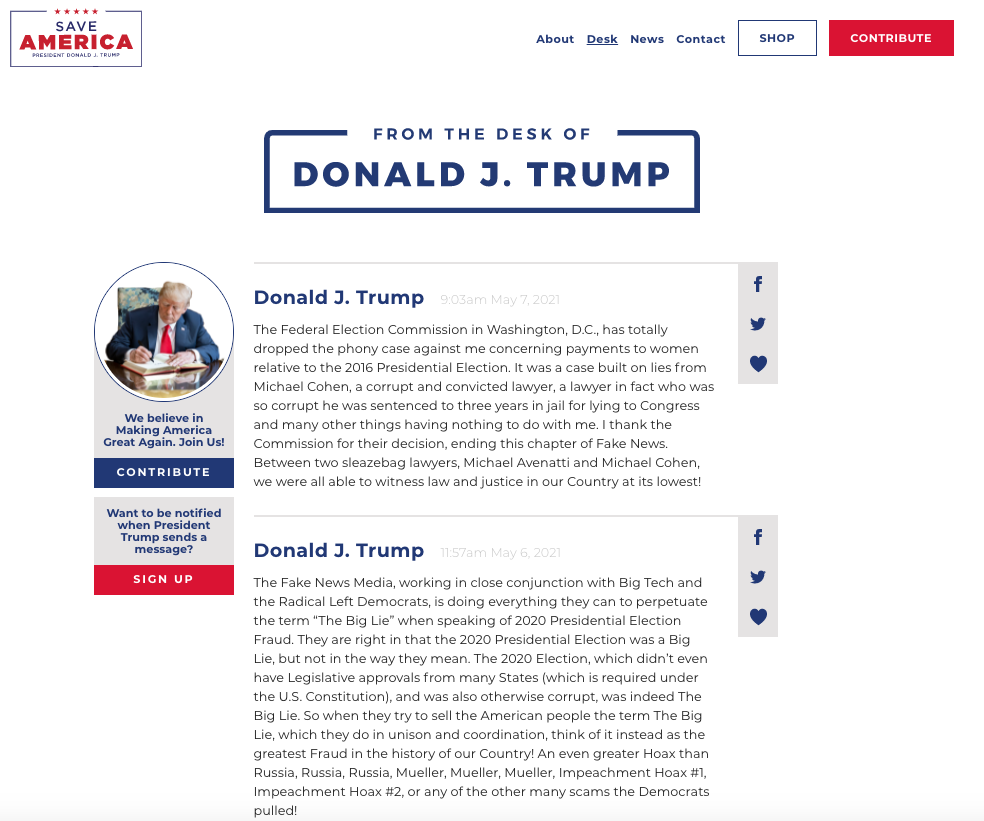Why Donald Trump’s “social network” is smarter than it looks

For months, we’ve heard the rumor that ex-President Trump was starting a social network. It’s up now. It’s called “From the Desk of Donald J. Trump.” As a social network, it sucks. But as a functional equivalent to Trump’s former Twitter account, it’s likely to succeed.
How Trump’s new megaphone works
Here are the rules for “From the Desk of Donald J. Trump.”
- Only Trump can post.
- A visitor can “like” a post or share it to Twitter or Facebook. A post that’s shared appears as a very short snippet and a link on Twitter, or just a link on Facebook.
- Every post has a URL, which you can see by clicking on it.
- A post can include text, graphics, or video. So far, no post has included a link outside of Trump’s site; it’s not clear if that would be possible. There’s no visible mechanism for name-checking Twitter users, either.

To state the obvious, this is not a social network. Comparing it to a social network is like comparing a handcart to a Tesla Roadster. It’s missing the crucial element: people.
- Social networks have visible members. This has only one.
- Social networks allow people to respond to content. This doesn’t.
- Social networks surface popular posts based on member interaction. This doesn’t. (It doesn’t even show how many likes something gets.)
Articles have described “From the Desk of Donald J. Trump” as a blog. That’s too generous. Proper blogs allow comments. Trump’s site doesn’t. It’s not a blog, it’s a series of bleats.
Rachel Happe, CEO of the Community Roundtable, is fond of saying “Control is for amateurs.” Social networks, like all communities, cannot thrive under strict control. And this one is under about as strict control as you can get.
“From the Desk of Donald J Trump” will serve Trump’s purpose well
Trump used Twitter as a megaphone. It allowed him to instantly translate his thoughts, provocations, insults, and endorsements into a space where everyone could see them. He reached 88 million followers. Unlike other politicians who use Twitter to interact skillfully with voters, antagonists, and allies, Trump’s Twitter account mostly ignored other users. While he name-checked events and people, there was never any attempt at dialogue.
He clearly needed that megaphone. He lost it when Twitter suspended him. Now he has duplicated it, free from the constraints and rules on a platform like Twitter.
While Trump will never get to 88 million followers on his own platform, it will serve many of the same purposes. He will be instantly out there with comments on everything that’s happening. His followers will instantly be able to spread those ideas by retweeting his text or sharing it on Facebook. He has reinserted himself in the dialogue.
Trump had also used Twitter to intimidate people who threatened to cross him or weaken his stranglehold on the Republican party. He’s using “From the Desk” to the same ends. He’s used it to threaten Liz Cheney and Mitt Romney already.
His allies will be able to share and respond to his ideas on this site, while his enemies will be able to challenge and ridicule them. But there will be discussion and controversy, which is what Trump thrives on.
Twitter and Facebook will find “From the Desk” creates challenges
Twitter has already suspended an account called DJTDesk that was retweeting the posts on “From the Desk of Donald J. Trump.” It cited its “ban evasion policy.”
We’ll now see a cat and mouse game between Trump followers and social media platforms.
If there are two Twitter users who retweet every other Trump post — creating, between them, a full feed — will Twitter ban them?
If a Twitter user posts every Trump tweet as well as hundreds of other tweets, will Twitter ban that user? (That description fit many Twitter users in the days before Trump was kicked off the platform.)
Will Twitter block all links to Trump posts, or only the ones that promote violence and hate speech? If it ends up banning links to Trump’s site, will users find other ways to post that content?
It’s a big mess. And Trump will enjoy every minute of it.
Trump’s megaphone is legal. The problem is not the megaphone, it is the messages.
Trump is going to accomplish many of his communications goals with this site.
He’s back online.
The same first Amendment that allows Twitter to kick Trump off allows him to create his own site.
If you have a problem with this, then the solution is to create communication that wins over more people and marginalizes Trump’s viewpoint.
That’s the only way to win the messaging war.
You nailed it with the “not a social network” description.
I do think it qualifies as a blog though. Comments aren’t necessary for that.
It does speak to his one-sided method of communication though, even though it may be because he didn’t want the people running the site to have to deal with a steady stream of the often irrational hate coming through the comments. That takes resources to deal with whether you do that with comment approval mechanisms or the whack-a-mole method of deleting them when they turn up. Maybe more features will be added as they grow.
He’s got his unfiltered soapbox up and running now and I bet the media services that profited greatly by nonstop Trump coverage are salivating at what is going to be posted. This could be interesting, but it also could be a chronicle of a grumpy old man that is no longer in the spotlight.
It is almost certainly a blog. But, tools like builtwith are blocked from determining the underlying technology (e.g. WordPress).
It is not difficult to feed twitter and facebook posts to the blog, if DJT wants to share them. The trouble is really how to make it easy for him to do so.
It would be trivial for Twitter, Facebook and elsewhere to filter Trump’s blog posts with a simple text comparison. Even if someone took a screen image and posted that, they have the ability to “read” the image as well.
That is, IF they are serious about blocking his communication on their platforms, and willing to p*ss off his many followers who will cry “censorship!!!”
Just one point : Your assertion : “That’s too generous. Proper blogs allow comments.” is incorrect. “Proper” blogs DO NOT have comments. Comments were NEVER part of the “blog” formula. In fact, for years blogs (Web Logs) had no means to comment, and were purely a “journal” or “diary” of activities on the web. . . . . . There are hundreds of thousands of blogs that do not offer commenting. . . . . . . . . . . . . I have to agree with you though, to say it’s kind of weird for Trump’s social network to be a one way “page” . . . but just remember, it’s his money. . . . . . . . . . . and isn’t it funny how people are still obsessed with Donald Trump? You filled in with a couple of “journalism” stories before migrating right back to Trump. The same for Medium. There are thousands of people on Medium writing articles, who just cannot get their mind off Trump. He is GONE but truly NOT forgotten! . . . . . . . . I would like to hear your views on blocking Trump, but allowing drug cartels and terrorist organizations to continue on Social Media. Yes, Facebook, Twitter, Quora, and a hundred other “social networks” are privately owned and can ban anyone they want to. Right. Yet notice how many people squeal like stuck pigs if one privately owned bakery refuses service to someone? Or a restaurant refuses service to someone? Isn’t it interesting how the “reason” for discrimination makes everyone think that it absolves them from discrimination. I’d like to hear your take on that. . . . . . . . . https://medium.com/teachablemoment
OK, let me respond to all of this.
1. Please don’t write lots of random thoughts with …. in between. It makes you look like a deranged loony. Most such comments don’t get posted, but I’ve made an exception since you make coherent arguments, generally speaking.
2. As the coauthor of a bestselling book on social media, I feel comfortable sticking to my definition of a proper blog. A blog without comments is not social media, as it has no social elements. And that makes it hardly a blog at all, regardless of historical anomalies.
3. People are far less obsessed with Trump than they used to be, because as ex-president he has only soft power, and because blocking him on social networks means he’s now far less visible. I write about him now only because I feel it’s important to discuss how this site he’s created may change his visibility. But I don’t expect to have very many Trump posts in the future. He is still the most prominent Republican in the country.
4. I think once social networks determine that a drug cartel or a terrorist organization is on their site, they shut it down. Certainly, they do so if such an organization promotes violence.
5. There is a difference in discriminating against a group vs. banning an individual. If a bakery said “We don’t serve Hillary Clinton,” there’s no law against that. If a bakery said “We don’t serve conservatives,” I’d see that as harder to defend. But it’s a debate worth having and I’m glad you brought it up.